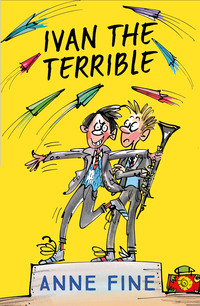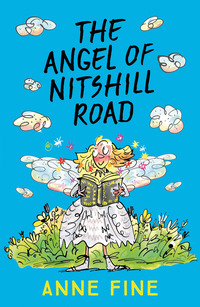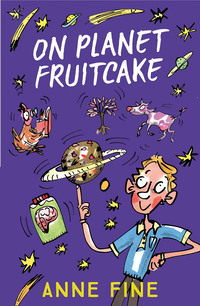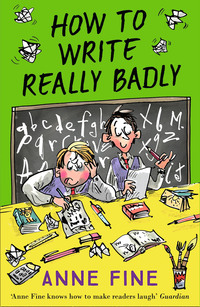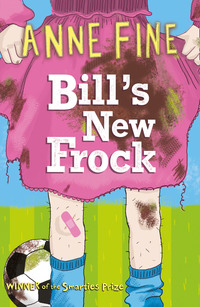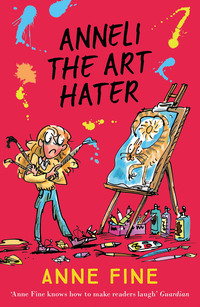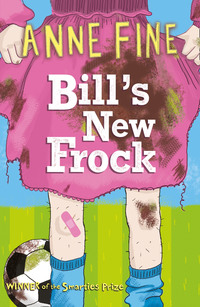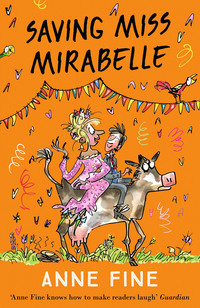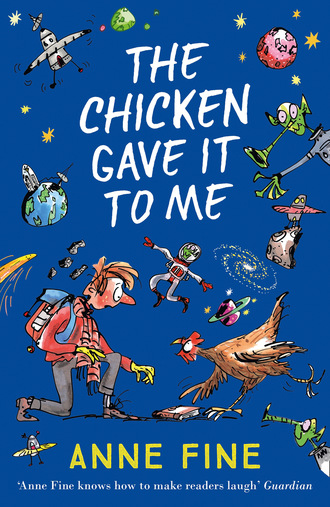
Полная версия
The Chicken Gave it to Me

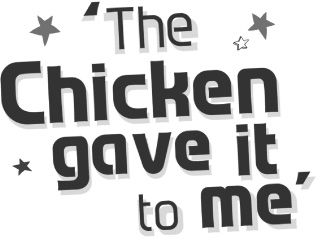
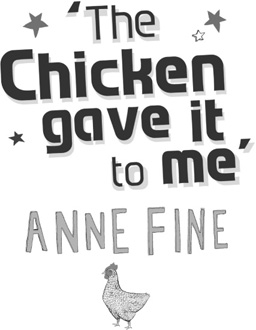

Contents
1 A tiny little book
2 The True Story of Harrowing Farm
3 Harpoon . . . Harpsichord . . . Harridan
4 I go chicken-dippy
5 Penguins or cheetahs, whales or sharks
6 I show myself to be naturally chicken-hearted
7 ‘Not today, thank you.’
8 Chicken no longer
9 Just a toy
10 Green sky. Green earth. Green wind. Green sand.
11 ‘No fear!’
12 Chicken of history
13 Been done before
14 Chat show chicken
15 In front of frillions
16 Chicken celebrity
17 Out it came
18 Surprises, surprises!
19 The last few words
20 Close them all
1
A tiny little book
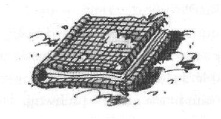
Andrew laid it on Gemma’s desk. A cloud of farmyard dust puffed up in her face. The first thing she asked when she stopped sneezing was:
‘Where did you get that?’
‘The chicken gave it to me.’
‘What chicken? How could a chicken give it to you? It’s a book.’
It was, too. A tiny little book. The cover was just a bit of old farm sack with edges that looked as if they had been – yes – pecked. And the writing was all thin and scratchy and – there’s no way round this – chickeny.
‘This is ridiculous! Chickens can’t write books. Chickens can’t read.’
‘The chicken gave it to me,’ Andrew repeated helplessly.
‘But how?’
So Andrew told her how he’d been walking past the fence that ran round the farm sheds, and suddenly this chicken had leaped out in front of him in the narrow pathway.
‘Pounced on me, really.’
‘Don’t be silly, Andrew. Chickens don’t pounce.’
‘This one did,’ Andrew said stubbornly. ‘It fluttered and squawked and made the most tremendous fuss. I was quite frightened. And it kept pushing this book at me with its scabby little foot – just pushing the book towards me whichever way I stepped. The chicken was absolutely determined I should take it.’
Gemma sat back in her desk and stared. She stared at Andrew as if she’d never even seen him before, as if they hadn’t been sharing a desk for weeks and weeks, borrowing each other’s rubbers, getting on one another’s nerves, telling each other secrets. She thought she knew him well. Had he gone mad?
‘Have you gone mad?’
Andrew leaned closer and hissed rather fiercely in her ear.
‘Listen,’ he said. ‘I didn’t choose to do this, you know. I didn’t want this to happen. I didn’t get out of bed this morning and fling back the curtains and say to myself, “Heigh-ho! What a great day to walk to school down the path by the farm sheds, minding my own business, and get attacked by some ferocious hen who has decided I am the one to read his wonderful book –”’
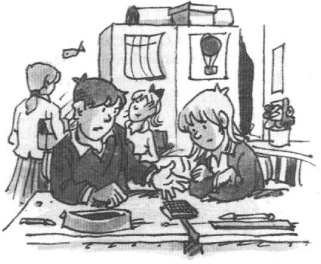
‘Her wonderful book,’ interrupted Gemma. ‘Hens aren’t him. They’re all her. That’s how they get to lay eggs.’
Andrew chose to ignore this.
‘Well,’ he said. ‘That’s what happened. Believe me or don’t believe me. I don’t care. I’m simply telling you that this chicken stood there making a giant fuss and kicking up a storm until I reached down to pick up her dusty little book. Then she calmed down and strolled off.’
‘Not strolled, Andrew,’ Gemma said. ‘Chickens don’t stroll. She may have strutted off. Or even –’
But Andrew had shoved his round little face right up close to Gemma’s, and he was hissing again.
‘Gemma! This is important. Don’t you see?’
And, all at once, Gemma believed him. Maybe she’d gone mad too. She didn’t know. But she didn’t think Andrew was making it up, and she didn’t think Andrew was dreaming.
The chicken gave it to him.
She picked it up. More dust puffed out as, carefully, she stretched the sacking cover flat on her desk to read the scratchy chicken writing of the title.
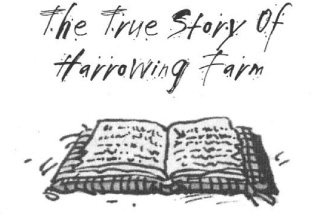
Opening it to the first page, she slid the book until it was exactly halfway between the two of them.
Together they began to read.
2
The True Story of Harrowing Farm

It was a wet and windy night, so wet you could slip and drown, so windy no one would hear your cries. Only a snake or a toad would choose to be away from shelter on such a night. And that is why only the snakes and the toads saw the gleaming green light pouring down from the black sky.
We chickens saw nothing, of course. How could we? There are no windows in the chicken shed. If we had windows, our lives could not be ruled so well by the electric light that decides when we wake and when we sleep and when we lay our eggs. After – oh, yes, of course, after – some of the hens in the cages by the door said that they’d heard the soft hum of the engines over the howling of the wind. But the rest of us think they were boasting. On that black night, the spaceship landed without a sound. And it was not until the shed door flew open, flooding us with an eerie green light, that most of us chickens woke with a flutter and a squawk.
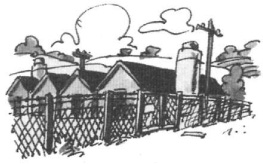
Little green men.
And they spoke perfect Chicken. (Later we found out they spoke Pig and Cow and Crow and pretty well everything. It’s one of the ways in which they are, as they put it, ‘superior’. They can speak any language they happen to meet. But on that first night we were amazed that they spoke perfect Chicken.)
Not that they were polite with it.
‘Chickens!’ said the spindliest and greenest, and it was almost like a groan. ‘Travel a frillion miles, and what do you find when you arrive? A chicken!’
The others flicked the catches of our cage doors with their willowy green fingers.
‘Out, out!’ they called. ‘Wakey, wakey! Make room! Out you get! Clear off! Go and make your own nests! The party’s over!’
The party’s over? We chickens couldn’t believe our luck. We’d been locked in those cages almost since we were born. Nothing to do. You can’t even stretch your wings. You just stand there on a wire rack (ruining your feet) for your whole life. And the one thing they want you to do – laying your egg – you’d far rather do in private.
The party’s over! I can’t describe to you the din as we all fluttered clumsily down, and scrambled unsteadily for the door.
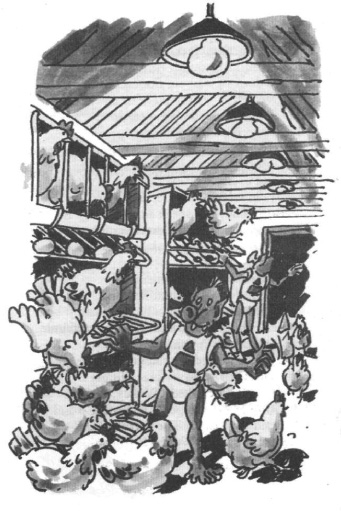
The little green men were even ruder now.
‘Call themselves chickens? I’ve seen finer specimens on other planets begging to be put down!’
‘Look at them! Twisted feet. Bare patches all over. And look at their beaks!’
‘Disgusting!’
‘Leave the door open as you go, please. This shed needs some fresh air.’
Fresh air! And we were out in it for the first time in our lives. We weren’t going to hang around shutting the shed door. No fear. We were away. The last I heard as I went hobbling off on my poor feet into the night was one of the little green men scolding the stragglers.
‘Hurry up. Out of those cages, please! We need tham for others.’
With one last shudder and a flutter, I was off.
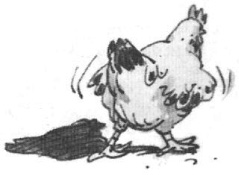
3
Harpoon . . . Harpsichord . . . Harridan . . .
Gemma read faster than Andrew. By the time he reached the bottom of the page, her eyes were already on him.
‘What do you think?’
He twisted his face into a worried frown. He was about to speak, she knew. But then he just shook his head. He couldn’t find the words.
‘You think the chicken might have come from one of the farm sheds you pass on the way to school, don’t you?’ said Gemma. ‘I didn’t know the place had a name.’
Andrew turned back a page.
‘Harrowing Farm . . .’ he read aloud. ‘Funny name.’
‘Not funny,’ said Gemma. ‘That’s just what harrowing doesn’t mean.’
‘Harrowing means raking,’ Andrew corrected her. ‘A harrow is a tool that breaks up lumps in the soil.’
Now it was Gemma’s turn to correct him.
‘When we went to London,’ she told him, ‘my dad wouldn’t let me go in the Chamber of Horrors. He said it would be too harrowing.’
Andrew lifted his desk lid and rooted in the mess till he found his dictionary.
‘Harpoon . . . harpsichord . . . harridan . . .’ His finger slid down the side of the page. ‘Here we are. Harrowing.’
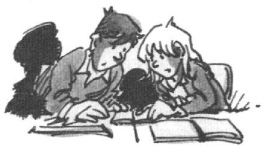
She leaned across, but he lifted the book and turned to face her so she couldn’t see. She just had to listen to him reading it.
‘Harrowing: breaking the clods in soil; or: terribly upsetting and distressing.’
Gemma ran her finger over the rough edge of the sacking cover.
‘So which do you think they meant?’
‘Maybe they meant both.’
‘Oh, Andrew! Surely not! Farms aren’t . . . Farms shouldn’t be . . . Why, everyone knows that farms are . . .’
Even before her voice trailed away, she was out of her seat and over to the bookshelf. Her fingers ran across the spines of the books as she read the titles aloud:
‘Life in the Arctic . . . China . . . Pterodactyls . . . Meet the Stone Age People . . . On the Farm. Here it is!’
She pulled out On the Farm. The book was for younger children really, but since the pictures were bright and clear, and there was quite a lot of information in it, their teacher had left it in the class library instead of sending it back to the Infants.
Gemma opened the pages at random. The pig was rooting contentedly with its snout in a frosty tussock of grass. The cow stood beside her calf, nudging her affectionately out of the ditch beside the hedge. In the soft summer evening sunlight, the hen ran happily round the orchard with her chicks.
‘Well!’ Andrew said. ‘The farm doesn’t look like that. It never has.’
Andrew should know. He’d walked past every day since he was five. There were no orchards, no hedges, no ditches, not even any tussocks of grass. There was fencing – miles of it to keep people out, and the land behind lay as flat and boring as a huge square of giant’s knitting. When Andrew thought about it, he realised he only knew it was a farm at all because he had been told. You never saw an animal as you passed by. All you saw standing in rows on the far side were six great long brown sheds.
‘The sheds! They’re not at all like the ones in this book.’
He pointed to the page with the picture of the pig. The shed behind stood crooked, with a drooping roof. Some of the tiles had slipped, leaving holes over the slats. The door hung on one hinge. And all around lay stones from a low wall outside that had tumbled down long ago.
And everywhere was green. Green, green, green, green. The shed was drowning in green – strangled with brambles, choked with weeds, surrounded by nettles, crowned with moss.
‘You could muck about in that shed for hours. Days! Weeks! Years!’
‘No wonder the pig looks happy . . .’
She sounded so wistful. Andrew looked up and saw she was gazing out of the window. She couldn’t see the farm from here. But he knew from the look on Gemma’s face that she had it in mind – the locked gate and the endless wire, the rows of huge brown sheds.
Suddenly the blood rushed to her cheeks. She stabbed the brightly coloured book fiercely with her finger.
‘If it’s not true,’ she cried, ‘if it’s not like this, why do people give us these books? Why do they try and trick us into thinking everything’s fine and hunky-dory? This book is as bad as a lie! So why do they do it?’
Andrew prised her stiff, angry finger off the page of On the Farm before she made a hole. Then he turned the next page of the book the chicken gave him.
‘Maybe,’ he said, ‘they don’t want you to think about it.’
They read on.
Конец ознакомительного фрагмента.
Текст предоставлен ООО «ЛитРес».
Прочитайте эту книгу целиком, купив полную легальную версию на ЛитРес.
Безопасно оплатить книгу можно банковской картой Visa, MasterCard, Maestro, со счета мобильного телефона, с платежного терминала, в салоне МТС или Связной, через PayPal, WebMoney, Яндекс.Деньги, QIWI Кошелек, бонусными картами или другим удобным Вам способом.


